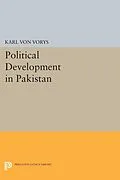An analysis of Pakistani politics under President Mohammad Ayub Khan that focuses on the practical limitations of that leader's ability to mobilize mass backing even when he is supported by a powerful army. Of particular significance is the non-totalitarian character of Ayub Khan's program.
Originally published in 1965.
The Princeton Legacy Library uses the latest print-on-demand technology to again make available previously out-of-print books from the distinguished backlist of Princeton University Press. These editions preserve the original texts of these important books while presenting them in durable paperback and hardcover editions. The goal of the Princeton Legacy Library is to vastly increase access to the rich scholarly heritage found in the thousands of books published by Princeton University Press since its founding in 1905.
Autorentext
Karl Von Vorys
Inhalt
- Frontmatter,
- Foreword,
- Acknowledgments,
- Contents,
- List of Tables,
- Introduction,
- 1. The Resource Base,
- 2. The Focus of Orientation,
- 3. The Range of Government Effectiveness,
- 4. The Governmental Capacity to Coerce,
- 5. The Governmental Capacity to Persuade: The Pressure of Aspirations,
- 6. The Governmental Capacity to Persuade: The Pattern of Leadership,
- Introduction,
- 7. The Quest for Nationhood,
- 8. The Plan for Accelerated Economic Growth,
- 9. Martial Law, a New Beginning,
- 10. The Genesis of a Constitution,
- 11. A Guided Democracy in Action: Building Influence,
- 12. A Guided Democracy in Action: Managing Reelection,
- Conclusion,
- Appendices,
- Index,
- Backmatter,
